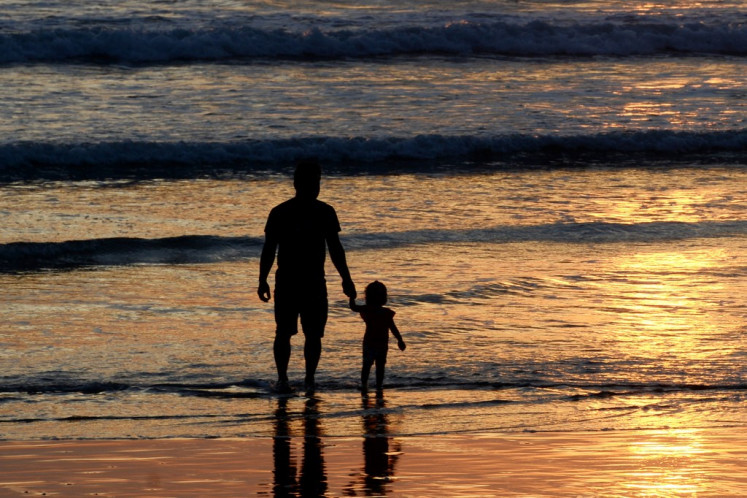Popular Reads
Top Results
Can't find what you're looking for?
View all search resultsPopular Reads
Top Results
Can't find what you're looking for?
View all search resultsIndonesian Jewish community unfazed by Israel travel ban
Happy: Members of the Jewish community chat at a synagogue in Rerewokan subdistrict, West Tondano, Minahasa regency, North Sulawesi
Change text size
Gift Premium Articles
to Anyone
H
appy: Members of the Jewish community chat at a synagogue in Rerewokan subdistrict, West Tondano, Minahasa regency, North Sulawesi. (JP/Eva Aruperes)
While many Christians and Muslims in the country have expressed their dismay at Tel Aviv’s decision to ban Indonesian tourists from entering Israel, members of the small community of around 250 Indonesian Jews remain mostly unfazed.
Rabbi Yohannes Elias of the Eits Chaim Indonesia foundation, which promotes understanding of Judaism, regretted the travel ban for its impact on Christian and Muslim pilgrims from Indonesia, but said it would have little impact on the Indonesian Jewish community.
Though Jewish people consider Israel to be their ancestral land, Yohannes maintained that Jews do not have any religious obligations to visit Israel at this time.
“In Judaism, there are three holy days that require Jews to make a pilgrimage to Jerusalem — Pesach, Sukkot and Shavuot —but that is only required once the Holy Temple is rebuilt,” he said, referring to the Jewish Temple in Jerusalem that was destroyed by the Romans in the early first century.
The United Indonesian Jewish Community estimates that there are around 2,000 Indonesians of Jewish ancestry. However, only around 250 follow Jewish practices, most of who are descendants of 16th-century European colonists.
Yohannes was equivocal about Indonesian-Israeli relations, saying only that to achieve the “eternal peace” in the Constitution, Indonesia had to maintain its ties with all countries.
“To work toward peace, we need to have connections and remain neutral,” Yohannes said.
Jerusalem, which Israel claims is part of its territory, is considered a holy site by most of the 220 million Muslims, 23.5 million Christians and the small Jewish community in Indonesia.
While Jakarta has been known as one of the fiercest critics of Tel Aviv in the Israeli-Palestinian conflict, Indonesians were still allowed to enter Israeli territory throughout their country’s long and troubled relationship with Israel.
That policy changed a few weeks ago, when Israel announced that Indonesian passport holders would be barred from entering the country from June 9 onwards. Tel Aviv’s move reciprocates Jakarta’s decision to bar entry to Israelis following the simmering violence in Gaza that has left dozens of Palestinians dead.
Indonesia Pilgrimage Travel Agents Association (IPTAA) vice president Maurizio Arifin Koeswara said about 2,700 pilgrims who had planned to visit Israel during the extended Idul Fitri holiday were now in danger of not being able to enter the country.
Many Christians were perturbed by Israel’s move, as a trip to Israel was more than just a vacation to them.
Abraham Sugio, a pastor at the Indonesian Bethany Church (GBI), has led religious tours to the Holy Land since 2004, guiding groups of four to 30 people to religious sites in both Israeli and Palestinian territories.
“I find that the trips have strengthened the participants’ faith, as they are able to see for themselves the places where Jesus lived and traveled,” he told The Jakarta Post on Tuesday. “I had planned to leave again on June 13, but with the ban, everything is up in the air.”
Anastasia Manapa, a 46-year-old airline employee who joined one of pastor Abraham’s tours to Israel, echoed his sentiments.
“I hope that the ban is only temporary, so my friends can also experience what it’s like to be in the Promised Land,” she said.
Indonesian Muslims, who are traditionally critical of Israel, were also disturbed by the ban.
Hefira Alfadiani, for example, had planned to travel to Jerusalem in September to visit Al-Aqsa Mosque, considered to be the third holiest site in Islam. “In one of the hadiths, the Prophet Muhammad tells Muslims to travel to three mosques: Al-Haram Mosque in Mecca, the Prophet’s Mosque in Medina and Al-Aqsa Mosque in Palestine,” said the 58-year-old woman.
Since she had already gone on haj and umrah (minor haj), Hefira expressed hope she would be able to visit Al-Aqsa this year.
“I hope that Israel will soon open [the border] again,” she said, although she added that she supported the government’s response to Israel’s “aggression”.










